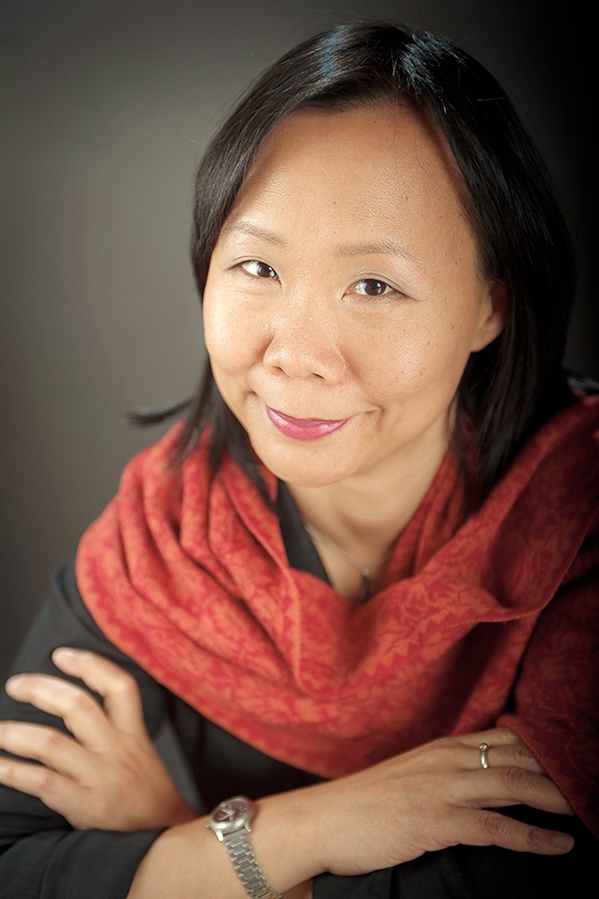Odes to Ordinary Objects
Special Projects Editor Kim Jernigan talks to Fiona Lam about her poem “Test,” winner of the 2017 Nick Blatchford Occasional Verse Contest. The titular test is a challenge set for a child by her grandfather: to move a handful of marbles from one bowl to another using a pair of chopsticks. It’s a test not only of her dexterity, but also her knowledge of culture and comportment. The judges said of the poem:
A virtuoso performance here, in the sense that the poem enacts the kind of care that the “test” it describes also requires: the same kind of precise “hoist[ing]” of “choice morsels”—words, here, not marbles, but the analogy is brilliantly clear. It takes guts to write a poem like this, in which you proclaim your own success: this poet pulls it off.
—Kim Jernigan

I know this is frivolous, but… I’m curious about the meaning of your Chinese name, Tinwei?
As I was born in Paisley, Scotland, I have both a Scottish name (“Fiona” comes from the Gaelic word for “fair”) and a Chinese name (“Tinwei” can be translated as “heavenly wisdom,” which is a very hard one to live up to). Perhaps writing is one way we can coax a trickle of wisdom our way—whether in the form of insight, awareness, understanding, compassion, or connection.
Both your winning poem, “Test,” and “Ode to the Plate” which is published alongside are poems about utilitarian objects. I’m wondering whether they are part of a longer series you’ve been working on. If so, I’d be interested to know something about what inspired the series.
About 17 years ago, when I was attending the Banff Writers’ Studio, Don McKay recommended that I read Pablo Neruda’s “Ode to My Socks” from Odas Elementales (Odes to Ordinary Things or Odes to Common Things). It was both a revelation and an inspiration to read a poem that used imagery in a playful yet profound way to plumb the essence and symbolic resonance of a quotidian object. I was also inspired by McKay’s own ode, “Setting the Table,” in his book Apparatus which had subsections about the knife, fork, and spoon. I then wrote my first ode to an ordinary object, “Lament of the Bowl,” and subsequent poems like “Omelet” (which I also turned into an animated video poem), among others. Later, I read Francis Ponge’s fabulous prose poem “L’Orange” with its sustained and focused attention on the sensual and magical aspects of the fruit, on the recommendation of Marguerite Pigeon whose book Inventory had been inspired by Ponge’s Le Parti Pris des Choses, published in 1942. My imagination was also tickled by the terrific prose poems about objects in Lorna Crozier’s The Book of Marvels: A Compendium of Everyday Things.
Their poems were my teachers, and led me to continue to try to write more ordinary odes. “Ode to the Plate” emerged from a handwritten page of riffs about plates. Pleased with that poem, I tried to riff about other implements.
The test of the poem “Test” is of a grandchild’s facility with chopsticks. But there are more complex rituals, customs, and beliefs invoked as well, including, or so it seemed to our judges, a test of the poet’s craft. Can you give us a sense of how the poem evolved and how it resonates for you?
I had a lot of fun writing about chopsticks. What sets “Test” apart from my other poems about ordinary objects is that there is a specific, concrete event or occasion that grounds its lyric exploration. It allowed me to juxtapose a child’s inner experience with the voice of an adult authority figure who is transmitting cultural knowledge and custom. I strove to imbue both “Test” and “Ode to the Plate” with the kind of wonder and delight that I experienced reading Neruda, McKay, Ponge, Pigeon, Crozier and most recently Sharon Olds’s poems in her latest book, Odes.
Is the grandfather in the poem based on your own grandfather? Can you give us something more of the man and your relationship to him?
I have such a strong memory of my grandfather testing me with a bowl of marbles at the kitchen table when I was a kid. My uncle also recalls that he wasn’t allowed to eat his meal until he’d passed this test when he was a youngster! My grandfather was an MIT-trained civil engineer and the patriarch of the family. He was a stern, strict, moral and religious man. It seemed easier to displease than please him. I visited him only twice in Hong Kong, and he visited us in Vancouver two or three times. But he was omnipresent in our lives through letters, long-distance phone calls, and my parents’ adherence to (and frequent reminders to me of) his dictates.
I know you as a poet, but also as an essayist. Do you tend to treat the same subjects in both forms, or are there subjects you think are inherently better suited to one form or the other? Or maybe the better question is what difference the compression of poetry makes to how you treat a subject? Can you describe the particular pleasures (or difficulties) of each form?
Sometimes one genre is a better fit for a theme or subject but I might not know until I’ve actually tried out the different approaches. Sometimes compressed, lyric language works best to convey a landscape, emotion, or experience; sometimes more straightforward and plainspoken language makes sense to analyze a concept, a decision, an idea or process. For example, in my prose piece in issue #143 of TNQ, “Cover to Cover,” I wanted to understand the motivation for getting married in light of the historically oppressive roots of the institution. I had written several poems about marriage in my first book, Intimate Distances, but with this prose piece I wanted to provide more context (historical background, scene, dialogue) for the narrative trajectory. I wanted to be more explicit and analytical, as opposed to allusive and imagistic, in depicting the connections. With poetry, I work more intensely with the exigencies of the line and the line-break, with the white space around words as a frame, with rhythm and sound. But I still consider those elements when writing lyric prose.
We advertise the Occasional Verse Contest as a place for poems about occasions public or private, conventional or unconventional. By the latter we mean to conjure experiences elevated to occasions by virtue of the poet’s attention. Perhaps, in that sense, all poems are poems of occasion, but can you share a few of the poems that have engaged you over the years either by making an occasion of something that might not have struck you that way initially or because of the poet’s perspicuity in drawing out the subtext of an event familiar to you?
The poems about occasions that come to mind are “Journey” by Tomas Tranströmer about a subway ride, Michael Ondaatje’s famous “Bear Hug” about the sudden insight that comes after a night-time hug with his son, Bronwen Wallace’s moving poem “Gifts” about her kid’s disappointment when the t-shirt that he has given her for her birthday doesn’t fit, and Sharon Olds’s “To see my mother” that depicts her mother’s exact moment of death and its significance. I also think of Russell Thornton’s powerful “Aluminum Beds” about the significance of his father assembling beds for him and his young brothers as a final parental gesture before disappearing from their lives.
There’s a certain thrill for our judges in being able to award a single poem with a cash prize considerably above what poets typically expect by way of payment for their work. Any thoughts about what you’ll put your prize to—an object? An occasion?
There’s definitely a thrill on the poets’ end too! It is rare for poets to be remunerated so well by publishers. I’m humbled by the honour of having been awarded the prize, and extremely appreciative of the generosity of Nick Blatchford’s family. I hope to use the prize money to travel to Waterloo to read at the upcoming Wild Writers’ Festival so I can celebrate with the fine writers who are prize-winners and runners-up, and to treat my extended family to a feast. The remainder will help pay for a much-needed short writers’ retreat in the spring. Three occasions!


